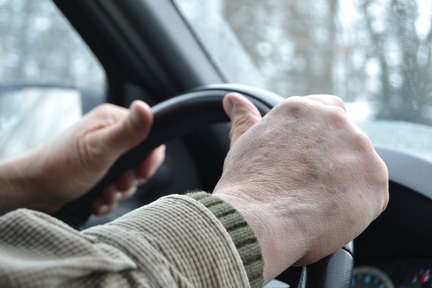Driving with dementia: New guidelines advise when it's time to stop
New guidelines have been published to help doctors and health care professionals assess when people living with dementia should stop driving.
 'Driving with Dementia or Mild Cognitive Impairment' - created by Newcastle University and the National Institute for Health Research (NIHR) - helps medical teams with the appropriate assessment and management of people living with the condition.
'Driving with Dementia or Mild Cognitive Impairment' - created by Newcastle University and the National Institute for Health Research (NIHR) - helps medical teams with the appropriate assessment and management of people living with the condition.
Dr. John-Paul Taylor, clinical senior lecturer at Newcastle University, said: "This can be a difficult conversation for anyone to have, whether you're a family member or doctor, because losing the ability to drive can have a significant impact on someone's independence and wellbeing.
"However, someone who is no longer safe to drive can be a source of concern for families and loved ones and may also put the driver and others at risk."
While many people with dementia (particularly in the early stages) are safe to drive, making the decision to ask someone to stop can be difficult and hard to broach.
The guidance should give greater clarity to people with dementia and those supporting them as to what to expect when being assessed for fitness to drive.
Tim Beanland, head of knowledge management at Alzheimer's Society said: "We hear regularly from people with dementia that being able to drive for as long as safely possible after their diagnosis is really important to maintaining their independence and identity.
"While a dementia diagnosis isn't in itself a reason to stop driving, a decision has to be made as to whether someone is still able to drive safely. That decision requires individual judgements which can be clinically difficult and need sensitive handling.”
He added: "People with dementia have the right to remain independent for as long as possible. When being assessed for fitness to drive they have the right to be treated in a fair and open way. We've worked with a range of stakeholders including the DVLA to encourage decision-making and communication by professionals to be as dementia-friendly as possible.”
Dr. Paul Donaghy, academic clinical lecturer at Newcastle University, and a key contributor to the guidelines adds: "This isn't about taking away the independence of people diagnosed with dementia, it's about clarifying the situation for clinicians though a clinical framework which works with people with mild cognitive impairment or dementia to support their independence and maintain their safety."
Changes in driving that indicate it is becoming unsafe include:
- Unable to hold a steady course in a defined lane—difficulty in following subtle changes in the course of the road
- Repeated failure to respond in busy environments such as junctions or crossings
- Seeming 'overwhelmed' in everyday driving situations
- Decline in ability to make independent decisions when driving
- Verbal prompt required by passenger
- Over-correction or erratic correction to changes in road direction or the environment
- Failing to release the handbrake
- Failing to check for hazards before moving off
- Trouble changing gears or missed gear changes
- Heightened passenger vigilance
Researchers worked with a number of external partners, researchers and carers to create the guidelines, including people affected by dementia, the DVLA and Alzheimer's Society.
For more information visit: https://research.ncl.ac.uk/driving-and-dementia/consensusguidelinesforclinicians/
Latest News
 29-Jul-24
Dementia Bus gives carehome.co.uk staff insight into life with dementia
29-Jul-24
Dementia Bus gives carehome.co.uk staff insight into life with dementia
 27-Jul-23
UK's top home care agencies in 2023 revealed
27-Jul-23
UK's top home care agencies in 2023 revealed
 30-Nov-22
A quarter of older people keep their falls secret from family
30-Nov-22
A quarter of older people keep their falls secret from family
 29-Nov-22
'Covid-19 has not gone away' say terminally ill
29-Nov-22
'Covid-19 has not gone away' say terminally ill
 28-Nov-22
IT consultant who received poor care opens 'compassionate' home care business
28-Nov-22
IT consultant who received poor care opens 'compassionate' home care business